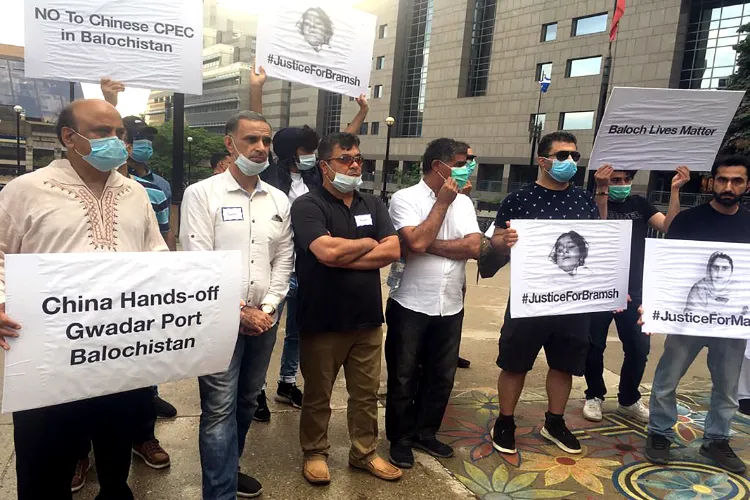
London
The Baloch Advocacy and Studies Centre (BASC) has released a critical report outlining the ongoing practice of enforced disappearances and extrajudicial killings in Balochistan for the year 2024.
This report records 674 instances of enforced disappearances, with 466 individuals remaining unaccounted for and only 208 having been released, revealing a troubling unresolved rate of 69.1%.
The report indicates a trend in which enforced disappearances increase right after attacks by Baloch resistance groups. In October 2024, there were the highest levels of enforced disappearances recorded (106), after a BLA assault on Chinese nationals in Nushki. Of these cases, only 32% resulted in the individuals being released.
May had the second highest series of cases (91), following the assassination of Allah Rakhia, a close ally of Balochistan Chief Minister Sarfraz Bugti. In that month, 84 individuals remained unaccounted for.
November experienced 90 disappearances after a violent suicide bombing orchestrated by the BLA. A mere 23 individuals who were abducted that month were released.
July saw 56 cases reported, coinciding with the national protest event organised by the Baloch Yakjehti Committee in Gwadar. August proved to be the deadliest month, with 54 disappearances and a rise in extrajudicial killings following a BLA bus attack that took the lives of 26.
February reported the lowest number of disappearances (31), even though there were twin bombings in Pashto-speaking regions carried out by ISIL that resulted in 28 fatalities. No retaliatory disappearances were noted in these areas, suggesting a targeted approach.
January, March, April, June, and December each had dozens of recorded cases, primarily associated with retaliatory measures in response to BLA-led operations against military sites and installations.
The region most impacted was the Kech district, which saw 199 cases, representing 30% of the overall disappearances. Dera Bugti documented 87 cases, while Awaran had 61.
The Makran Division, encompassing Kech, Gwadar, and Panjgur, constituted 42% of all disappearances reported in 2024. These districts boast some of the highest literacy levels in Balochistan and are recognised for their political engagement and mobilization.
Dera Bugti, consistently affected by military actions since the killing of Nawab Akbar Bugti in 2006, continues to be a hotspot. Following the assassination of a close aide to CM Bugti in May, there were 29 reported disappearances in the district as a form of collective retaliation.
Disappearances have also been noted outside Balochistan: 15 people were abducted from Karachi, and 13 from Dera Ghazi Khan. Additionally, one case involving a prominent Baloch figure, Wahid Kambar, was reported across the border from Iran.
Students represented the most impacted demographic. Among the 455 known victims, 187 were identified as students, accounting for 50.4% of the total cases. Out of this group, 118 individuals are still unaccounted for.
Labourers ranked as the second most affected category, with 89 disappearances reported and 61 of those individuals remaining missing. While drivers and small business owners were also targeted, the numbers were lower.
Baloch students, especially those engaged in political activities, have encountered significant harassment not only in Balochistan but also in other parts of Pakistan, such as Islamabad. Their involvement in organising protests, distributing literature, and voicing their opinions has made them specific targets for surveillance and detention.
It is believed that many of the working-class people who were abducted are relatives of politically active individuals, indicating a trend of collective punishment aimed at undermining social unity.
Among the 316 individuals released in 2024, 142 regained their freedom within the first week. Seventy-three were let go within two weeks, while 32 were detained for more than a month. Some individuals had been unaccounted for up to three years or more before their release.
Short-term detentions seem to act as tools of intimidation, relying on unreliable information obtained from criminal informants. Extended detentions typically involve suspicions of connections to the Baloch national liberation movement, frequently accompanied by clandestine military trials or extended torture.
Thirty-two people who had been forced to disappear were killed extrajudicially. The biggest number of these killings occurred in August (12), October (6), and December.
Between August 11 and 14, which coincided with Balochistan's historic declaration of independence in 1947, four people were slain. After the BLA bus attack, seven additional people were slain between August 26 and 28.
Kech had the most extrajudicial executions (8) in the district, followed by Awaran (6), Panjgur, and Khuzdar (4 each). Additionally, killings were recorded in Kharan, Kalat, Gwadar, Nasirabad, Nushki, and Karachi.
According to BASC, in order to hide proof of state atrocities, some of these murders were staged as fictitious encounters or the victims were interred in mass graves.
Despite Pakistan ratifying the ICCPR in 2010, it has failed to ratify the International Convention for the Protection of All Persons from Enforced Disappearance (ICPPED).
The Anti-Terrorism Act (1997), the Protection of Pakistan Ordinance (2013), and the Anti-Terrorism Balochistan Amendment Act (2025) are cited as legal enablers of enforced disappearance, granting unregulated powers of arrest and detention.
The state-run Commission of Inquiry on Enforced Disappearances (COIED) has failed to hold any perpetrators accountable, and victims' families report intimidation and mistreatment during hearings.
Disappeared individuals have been used in political campaigns, notably in 2018 when some were "returned" to boost the popularity of BAP candidates. In other cases, victims have been traded to coerce family members or gain leverage over militants.
The BASC concludes that Pakistan is waging a systematic campaign of repression against the Baloch people. The high targeting of students and breadwinners suggests a deliberate effort to undermine the intellectual and economic foundation of Baloch society.
ALSO READ: 10 things that changed in J&K after the abrogation of Article 370
BASC urges international human rights bodies to demand accountability from Pakistan, ensure transparent investigations, prosecute those responsible, protect journalists and activists, and pressure Islamabad to ratify ICPPED.
